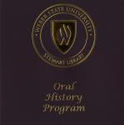
"@weberqueeringthearchive is taking good care to make sure queer voices are amongst the archives documenting the history of our time and place."
Toasted Lavender Podcast
"We hope that all members of the LGTQ+ community know that their voices and stories matter, and that they will find themselves reflected in the archives."
Sarah Langsdon, Head of Special Collections
Queering the Archives
Welcome to Weber State University’s Queering the Archives: LGBTQ+ Oral Histories page! In 2021, Weber State University Special Collections embarked on a project to help fill the gaps in the historic record to include stories from the LGBTQ+ community in Weber, Davis, and Morgan Counties.
The movement and theory known as Queering the Archives aims to address the absence of a queer perspective within the field of archival work, which influences how materials are evaluated, preserved, and made accessible. By embracing a queer lens, the archival institution can undergo a transformation that fosters inclusivity and social justice, while also reimagining historical narratives. Historically, the archival establishment has reinforced dominant power structures by disregarding and erasing the histories of marginalized communities. To challenge this, queering the archival institutions involves confronting these power dynamics and intervening against the racist, sexist, classist, and heterosexist frameworks that sustain them.
In essence, queering the archive redefines our understanding of lives and opens up boundless opportunities for inclusivity in the pursuit of social justice and the reshaping of history.
Traditionally, the theoretical approach to archival processing has upheld a stance of neutrality and impartiality, allowing future researchers to interpret collections. However, this supposed neutrality has only served to further marginalize individuals deemed "queer" by society. By incorporating a queer lens during the processing of archival collections, one can challenge conventional structures and actively counteract the racist, sexist, classist, and heterosexist systems that uphold them.
The act of queering is to actively complicate traditional notions of how stories are told and documented. Patrick Steorn suggests going beyond “homosexuality” or “queer” in databases because one will not find hits using these terms, but instead to look into ‘contextual research,’ in places that could be read as queer. Steorn also brings up a reminder that “the term ‘queer’ was coined to destabilize homogenous identity categories, so to insert it as a static label in a museum [or in this case archival database] would be to work against its disruptive power” (Zepeda, 2018).
“Queering the Archives” is generously funded by Project Rainbow Utah, the Utah Humanities Council, and the WSU Office of Diversity.
Zepeda, Lizeth (2018) "Queering the Archive: Transforming the Archival Process," disClosure: A Journal of Social Theory: Vol. 27, Article 17. DOI: https://doi.org/10.13023/disclosure.27.14


























